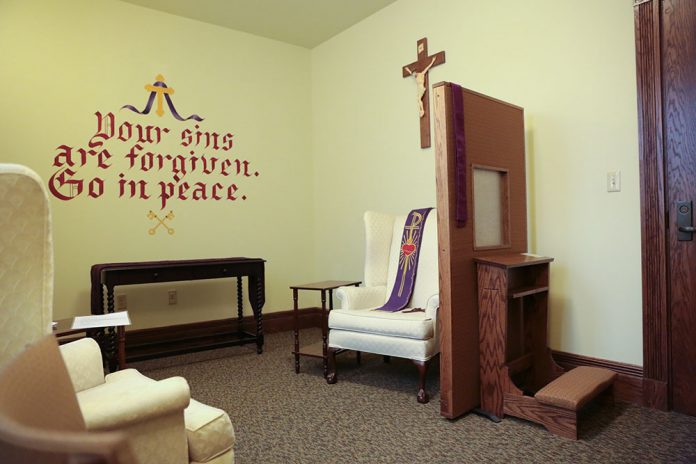
by Dan Thomas, Kate Ristow, Chris Weber, and Sr. Janet Schaeffler
What are good reasons to combine our parish RE program and Catholic school First Communion celebrations?
Q: I have 11 years of experience as a DRE, but this is my first year being a DRE in a parish that has a Catholic school. Although this parish’s celebration of First Communion has been a combine group of children from both the Catholic school and the parish religious education program for the past five years, a group of parents approached me to ask if I could influence a change in this policy—a celebration for Catholic school children and a separate celebration for the children in the religious education program. I think the combined celebration is a good policy because it builds community. What other reasons might I give these parents for the combined celebration?
—South Florida
Kate Ristow’s Answer
A: I completely agree. The celebration of First Eucharist is a time to celebrate your unity, not your diversity. It is a time for all the children to come together with their families to share in this great mystery of our faith—the Real Presence of the Body and Blood of Christ in the consecrated bread and wine we eat and drink.
It is common for this issue to arise in parishes that have both a Catholic school and a parish religious education program. In my experience, the request has always come from the school parents, never the school staff or the families of children in the parish religious education program.
The rationale of the parents of the children in the Catholic school is that, because their children go to school together every day and are friends outside the classroom, it would be more meaningful for them to celebrate the Eucharist with their classmates. On paper, that makes sense. But my original point still stands: You are one parish and, therefore, you celebrate the Eucharist as a parish family.
You need to know where your pastor stands on this issue before digging your heels in. Talk one on one with him and let him know what school parents are lobbying for. Express your feelings and ask him for his thoughts. If he is a veteran pastor, he may say something like, “Oh, this comes up every two or three years. We just need to explain to the parents why we celebrate the Sacrament together.”
However, if the pastor replies, “Great idea! Let’s do that,” you are probably going to end up planning two celebrations.
Yes, you can argue with the pastor. You can pitch a fit and throw down the gauntlet. You can proclaim, “Over my dead body!” all you want. But why? You are not going to win this argument if he chooses to initiate separate but equal celebrations.
Instead, you might ask the pastor if he wants separate Eucharist parent meetings as well, and if that is the case, why not have separate First Reconciliation parent meetings and two First Penance celebrations? Hopefully, he’ll see how divisive and unnecessary all this is.
You can also appeal to your pastor’s work ethic; today’s priests are swamped. (Yes, I know you are busy, too!). Does he really have the time to do separate celebrations? Will the parish calendar even allow separate celebrations without interfering with weddings or funerals?
If your pastor agrees with you—that one celebration is the best idea—do not let the issue become a cause. It would be best if Father addresses the issue succinctly at the initial Eucharist parent meeting. If he wants you to do it, however, be direct. Announce that you and Father have discussed a request for separate celebrations for First Eucharist and that Father wants the children and families to celebrate together because you are one community. Period.
Then move on to your next announcement. People may gripe, but most parents will accept the decision and, hopefully, come to see its wisdom.
Kate Ristow, Contributing Editor to CATECHIST, has worked in Catholic publishing for over 25 years as a national speaker and writer, building on a wealth of experience in the religious formation of children and catechists in both parish and Catholic school programs.
Janet Schaeffler’s Answer
A: I have learned and I have experienced an interesting phenomenon about human nature throughout my years in parish and archdiocesan ministry: When a new person comes into leadership within a group or an organization, those who would like something changed about an established practice, tradition, or policy immediately approach that person to campaign for that change. (This is probably true in other areas of life as well.) Often times, this one person does not have the authority—or the sole authority—to make the change.
The situation you describe happened to me. In that situation, the practice of celebrating First Eucharist as a parish had been in existence for about 20 years.
Here are a few things to bear in mind about our understanding of Eucharist.
Everything about the theology of Eucharist reminds us that it is the Sacrament of unity, and so our celebration of First Eucharist needs to mirror that in every way. We are one parish; we are one people; we are the Body of Christ in this place, at this time. One of the implementation steps of the policy regarding catechesis for the celebration of First Eucharist in one of our dioceses says: “At the parish celebration of First Eucharist there is no distinction made between those who attend the catechetical program in the parish and those who attend the catechetical program in the Catholic school.”
For many reasons, “preparation” for Sacraments is certainly related to but somewhat different from religious education, that is, our ongoing catechetical efforts. The General Directory for Catechesis says: “Certain situations and circumstances require special forms of catechesis,” especially for sacramental moments when “people are disposed more than ever to seek out the true meaning of life” (n. 176).
Sacraments are not events for just the individual. Neither are they events belonging to a single group. Rather, they are celebrations of the Body of Christ. Preparation for and celebration of the Sacraments flows from and affects the whole parish. Those preparing to celebrate Sacraments—in the ideal world—are catechized, guided, and mentored by their families and close peers as well as many others in the parish community. This is one reason—among others—why many parishes design sacramental preparation programs that are unified, that is, distinct from the regular, graded catechetical program.
Eucharist calls us to unity. Eucharist intensifies who we are as one people.
After many years in parish and diocesan catechetical ministry, Janet Schaeffler, OP, is currently involved in catechetical/adult faith formation consultation, writing, workshops, days of reflection/retreats, and teaching. Her website is janetschaeffler.com.
How can I help students select meaningful, memorable saint names for Confirmation?
Q: I am embarrassed to admit that I do not remember the name of the saint that I “took” at Confirmation. Of course, I’m going back nearly 50 years. How can I help the students I teach who are preparing for Confirmation to pick saint names that will be meaningful and memorable for them?
—Huntington, NY
Dan Thomas’s Answer
A: First of all, don’t be too hard on yourself about not being able to remember your Confirmation name. Many of us at that time received Confirmation in the third or fourth grade, so the details may not have stayed with us. I think it would be an interesting exercise to see what you do remember about your Confirmation experience as a way to guide what you are doing with your students now.
The approach to Confirmation 50 years ago was probably significantly different from the present approach. I learned that I was going to become a “soldier of Christ” to defend my faith and maybe even be called to die for it. Your experience may have been similar.
The process of choosing a saint’s name can be approached in a way that puts the young people in touch with the role of saints in the Church and in their personal lives today. Saints in today’s Church are thought of not so much as patrons (a medieval concept) who get us things from God that we can’t get ourselves. Rather, we look to saints today as role models who lived a particular virtue or virtues in heroic ways that we can imitate in our own lives.
Talk with your students about the Communion of Saints and what it means. Our Church believes that we are united as the Body of Christ with those alive now, those who have gone before us, and those who will come after us. In other words, we are all in this together for and with each other.
A place to begin might be to have students look at their own gifts and talents. Who are they as persons and what is unique about them? What are some gifts that they would like to have but don’t? Then present the lives of some of the saints who made an impact on the times in which they lived. It is essential that we don’t make of them persons who are so perfect that the young people can’t relate to them. Every saint had his or her flaws and difficulties. Today’s students need to know this.
Since one option is for confirmandi to use their baptismal names, they could still choose saints they see as their guides or models. Make available books on the saints that present their lives realistically and meaningfully. Spend a minute or two each session focusing on a saint.
Choosing a saint’s name can be a valuable experience. I am certain, however, that no matter what we do, some will forget their Confirmation names. But our teaching is not for the future alone, but for what it means in our lives now. This may be the most important part of what we do.
Dan Thomas served in catechetical leadership for over 30 years and remains involved in the National Conference for Catechetical Leadership (NCCL). He and his wife, Eileen, are the parents of two adult sons.
Chris Weber’s Answer
A: Make the process memorable by starting with the obvious; make it meaningful by digging deeper. Here’s how:
Before starting, lead a prayer to the Holy Spirit, inviting the Spirit to inspire your students’ search. Encourage your students to make this a spiritual exercise and to ask for God’s help.
Part 1: Start with the obvious.
Have your students brainstorm lists of names. The following three lists come to mind:
a. People they admire: Invite students to list, in any order, the names of people they admire. Encourage them to write down the first people who come to mind: sports figures, celebrities, favorite teachers, family members, historical figures—both religious and secular, etc. Next to each name, have them write what they admire about the person. Again, do not limit what they can write; admiring someone because they are “cute” is all right!
b. Activities they enjoy: Have students write down their favorite activities, including sports, extracurricular activities, or hobbies.
c. Names they like: Have students write down names they like. Next to each name, have them write a reason why they like it.
Because of the personal nature of this activity, this free association will generate some possibilities that are memorable.
Part 2: Dig Deeper.
Ask students to prioritize their lists of names and to come up with no more than five names to which they have the greatest personal connection. Also have them name one favorite activity. Now is the time for research. Ask them to look up the names in a directory of saints, such as Catholic Online’s “Saints and Angels” page at catholic.org. If there are multiple saints with a first name that they selected, they should read about each of them to see if one catches their attention. They can also browse through patron saints to see if there is a specific one connected with the one favorite activity they named.
Part 3: Decide.
Ask students if they felt a connection with any of the saints they researched. Did they admire a quality in a saint? Did they like the type of work a saint did, or did they feel a connection with where a saint lived? Did they connect with a saint because of his or her patronage?
If they can say “yes” to any of these questions, then ask them if they could become comfortable asking that saint to pray for them throughout their faith journey. If they say “yes” to that question, then they have found their saint!
Chris Weber has worked in the field of catechesis for over 20 years as a catechist, a parish catechetical leader, and a diocesan staff member. He is the author of Jesus-Style Recruiting: A Fresh Look at Recruiting and Forming Parish Volunteers, published by Visual Dynamics Publishing. He is currently Director of the Mount Summer Program at Mount St. Mary’s University in Emmitsburg, MD.
Copyright 2012, Bayard, Inc. All rights reserved. This article is protected by United States copyright and other intellectual property laws and may not be reproduced, rewritten, distributed, redisseminated, transmitted, displayed, published or broadcast, directly or indirectly, in any medium without the prior written permission of Bayard, Inc.




